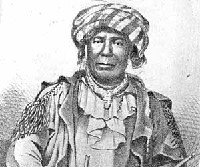 I'm writing a book set in 1832 during the last Indian war east of the Mississippi, and a year before the treaty that forced most local Indian tribes west, and I found it interesting to read that the Prairie Band of the Potawatomi are coming back to Shabbona, IL.
I'm writing a book set in 1832 during the last Indian war east of the Mississippi, and a year before the treaty that forced most local Indian tribes west, and I found it interesting to read that the Prairie Band of the Potawatomi are coming back to Shabbona, IL.Shabbona is about 70 miles west of Chicago and named for a local Potawatomi leader known for his leadership around the time of the Black Hawk War.
Here's an excerpt from the Chicago Tribune article, headlined "Tribe won't say if casino is in the cards".
"After more than 150 years, we have a piece of our original homeland back," said Chairwoman Tracy Stanhoff of the Prairie Band Potawatomi, who were forced to leave Illinois for Kansas in the 19th Century. "We are home now."
The History Page on the Prairie Band website explains that the band still has a claim to the land.
The 1830 Removal Act was a governing policy of the United States government. The policy revolved around a dream that the Indian "problem" could be eliminated forever by persuading the eastern Indians to exchange their lands for territory west of the Mississippi. The exchange would leave the area between the Appalachians and the "Father of Waters" free for white exploitation and settlement.I don't care that much about the casino issue, but I'll be interested to follow how this land case progresses.
However, the 1829 Treaty of Prairie du Chien reserved two sections of land near Paw Paw Grove, Illinois for Potawatomi Chief Shab-eh-nay and his Band. In 1849, the land was illegally sold through public auction by the U.S. Government. Since an act of Congress or a subsequent treaty is necessary to extinguish the Tribe's rights to the reservation and it wasn't included in the cession treaties, it continues legally to belong to the Prairie Band.

No comments:
Post a Comment
Hi! Feel free to leave a comment. You do your part, and I'll try to keep the conversation going.